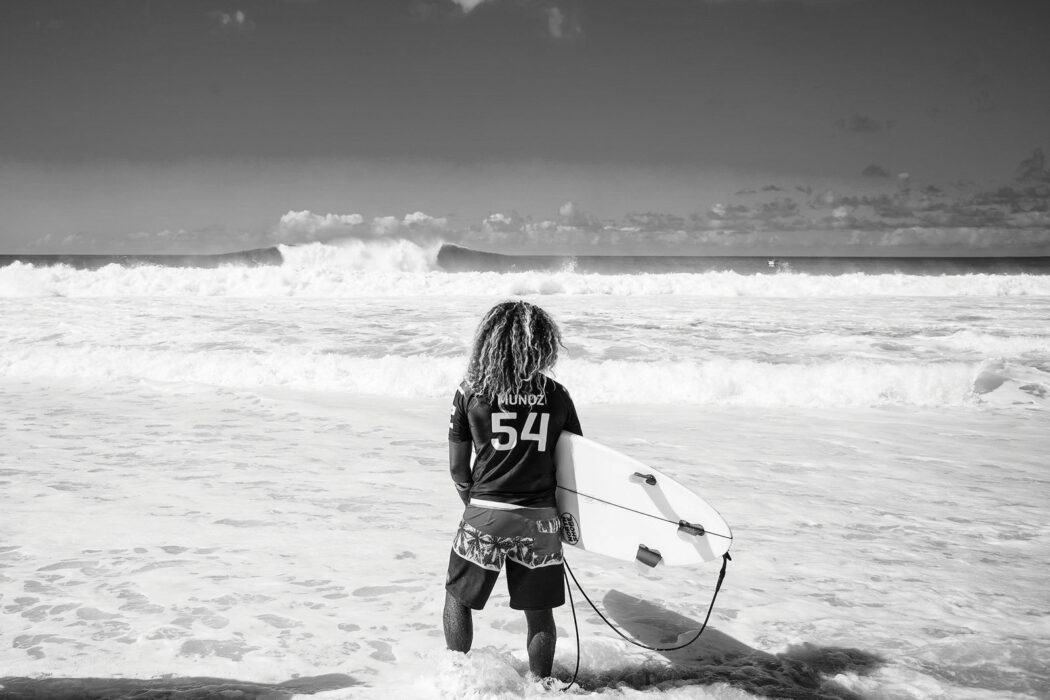The Interview with Pro Surfer Carlos Muñoz, also known as Cali
Carlos Muñoz has potentially one of the better outlooks out there. Likely heavily influenced by the people and country he is surrounded by. His journey to the World Surfing Tour included a couple of injuries and, no spoilers, quite a journey toward the Olympics (more on that below). Through a bit of adversity, he maintains that his life “is a song” and the melody is one we’re moving our heads to. Carlos, affectionately known as Cali, was kind enough to share his ups and downs and advice on crocodiles.
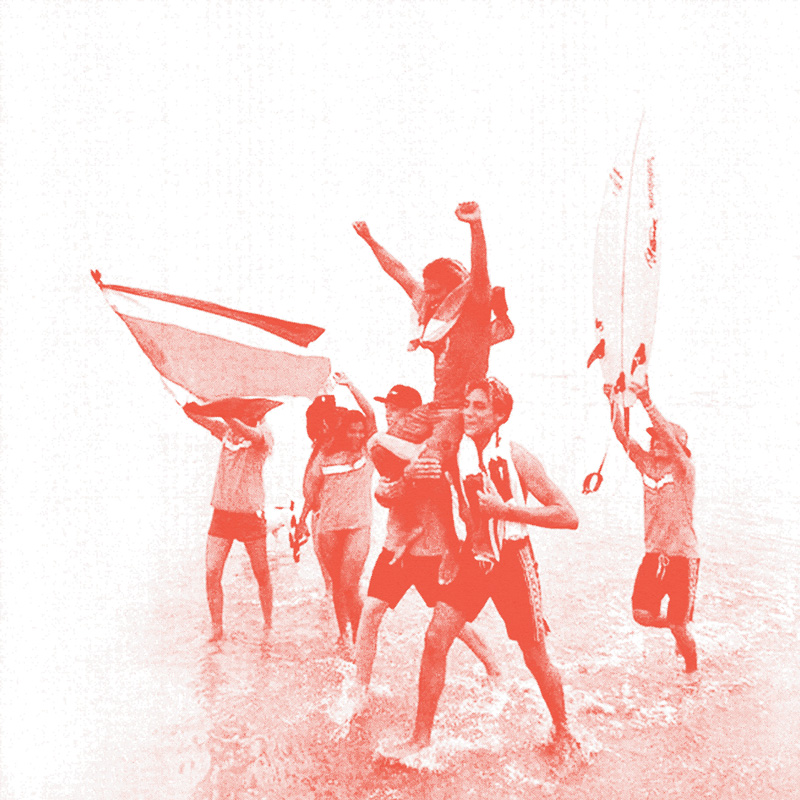
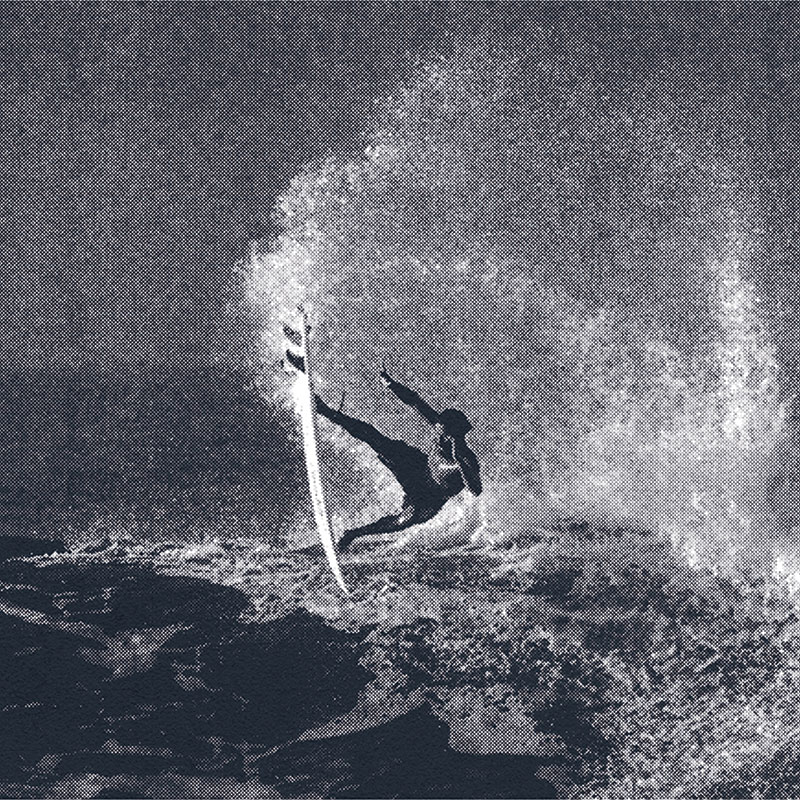
Whalebone: You grew up near the beach. How do you think that shaped you?
Carlos: I grew up in the city until I was 9 years old, and in 2003, we moved to the beach for the first time. Going from the city to the beach was an amazing change of life, because I feel like in the city you’re trapped in your home a bit more and don’t have that connection with nature. And when we got to live at the beach—there were a lot of kids, and we were playing soccer, we were playing at the beach, we were going in the sea, on the rocks, and then, that’s how I met surfing.
First I was scared of the ocean when I was a kid, because I would always see news of sharks in Florida and so when we moved to the beach I was afraid of that. But one time my mom took me by the hand, and with my brother in the other hand, and every time the white water was coming, she would say, “Oh, go under.” We played like that. And then when the wave wasn’t breaking, like, “Jump!” I’d get these butterflies in my stomach—I think that’s when I got in love of the ocean.
WB: You meet someone on a plane who’s never been to Costa Rica and doesn’t surf. How do you describe Costa Rica to them?
CM: When I travel to different places I talk about the people first, because I think the Costa Rican people have a very human connection—when you get here, you feel like you belong here. That’s why when people ask, “Oh, are you from Costa Rica?” “Yes, I’m Costa Rican.” “Whoa, I’ve been there. The people are so nice.”
They protect everything. I talk about the animals, the volcanoes, and the beautiful waterfalls that we have. It’s a little country and you can find everything that you need if you are looking for natural adventures, or if you want to connect with people.
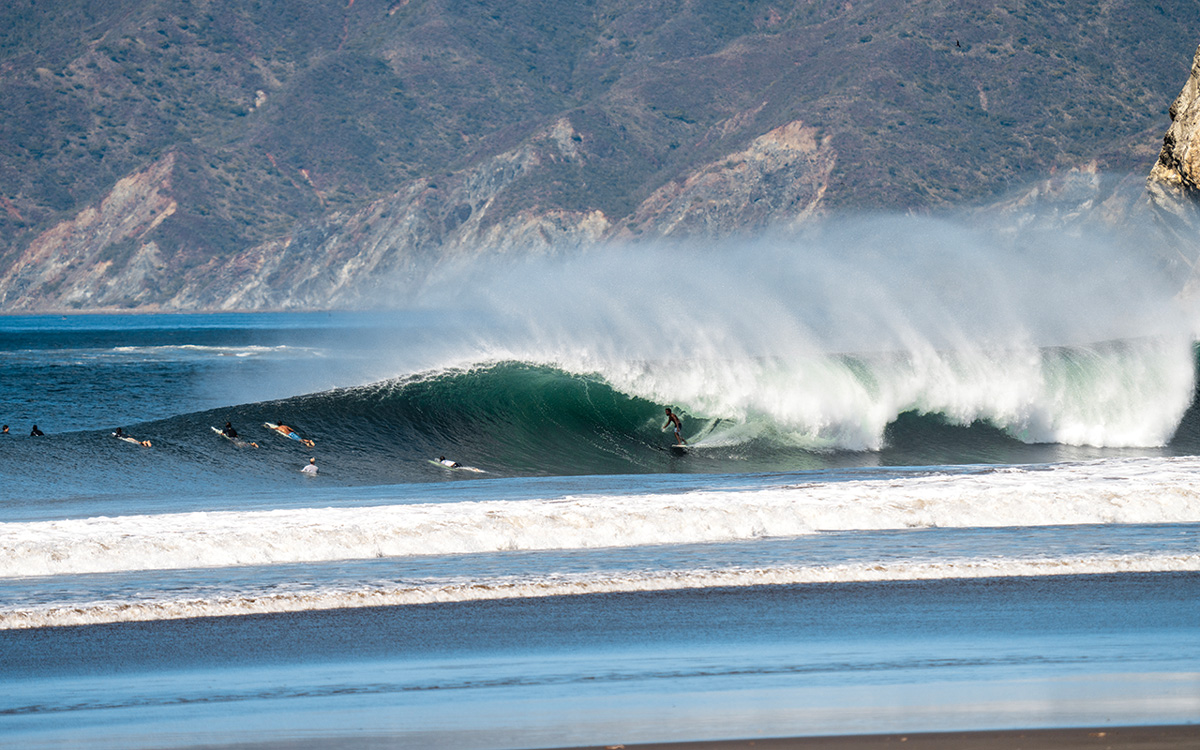
WB: Three songs that you feel would be on the soundtrack of your life?
CM: Wow. My life is a song.
WB: Someone you looked up to while you were growing up?
CM: My mom and my dad split when I was probably 6 years old. So we grew up with just our mom—she’s a very strong and soft woman. I think that that connection with my mom, and how she treated us, that’s what I always look up to. Even when at the lowest point in her life, she was always walking forward.
WB: Someone you look up to now?
CM: Now I look up to God.
WB: Can you share your story about having to overcome tremendous adversity to be on the World Tour and in the Olympics for surfing?
CM: They already had the 2020 slots filled for the Olympics in Tokyo. And so I was here sitting in my house, feeling way better about my knee a couple of months after my injury. I was talking with my brother, asking what we were going to do for the Olympics—like where are we watching and where are my friends and all the people going to be. And then I received a call on the day that they were opening the ceremony of the Olympics.
The president of Costa Rica was like, “Hey, man. They’re calling you because somebody got COVID and you were the next in line.” I was like, “What?” “No, yeah, for sure. You have to make it.” But I was like, “The roads are closed (there was a huge storm), how am I going to make it? I don’t have my passport, I don’t have clothes, I don’t have the accreditations, everything is full of water.”
The president said, “I don’t know how we’re going to do this, but you have to make it there, you have to leave tomorrow if you’re going to get there.” My wife said, “Okay, let’s put this on Facebook. Maybe somebody can help.” And then, right away she posts something, and in like five minutes, I don’t know how many comments and how many people were trying to reach my phone while I was driving and trying to get through this road. I talked to the police and said, “Hey, I got a call for the Olympics, can you help me to get out?” And they said, “There’s nobody coming through this road, so forget it.” My phone starts ringing and ringing and ringing. That was maybe around 8:30 p.m.
We tried to drive, and the road was closed. We went to another road and then we got to this point where the cars were coming to one side and the cars were coming to the other side and it was impossible to make it.
Some people on the road said, “We’re going to send you a helicopter.” Some other person was like, “Hey, how can I help you?” Somebody from the government called me like, “Hey, I’m the principal of this, can I help you?” The other communications channel, too: “How can we help you?” On and on and on.
Finally, I talked to the police again, and they opened the road for us and he’s like, “Hey, it’s super dangerous. We’re going to send you a fire truck so you have to leave your car there and jump into the fire truck because you need to make it to San José and get some COVID tests.” And then my friend from Hawaii called me like, “Hey, Carlos, I’m gonna buy you any ticket that you need to get there. I don’t care how much it is. This is my credit card.”
And that’s when I remembered that I didn’t have my credit card and I left it in the hotel where I was staying.
I drove all the way back, got my stuff and it was almost 2 a.m. already. I drove all the way back to the road and jumped into the fire truck. I left my brother with my car and all my stuff, my boards and everything.
They opened the door of the aircraft and everybody let me go out first. These people from United Airlines helped me to go through Customs. And then the guys of Customs got out, we were like, “Oh no, how are we going to help you? Send these guys to the Olympics. Send me the accreditation.”
That road going to San José was destroyed. If anyone was to go through with a normal truck, they probably would’ve died because there were a lot of rocks and a lot of trees down and it was raining too much. The lady that was in charge of the accreditation brought the stuff to the president of the federation. My mom went and picked up the passports. Another guy brings me some boards from all over Costa Rica. I got the COVID test and at 5:30 in the morning, I was already in the airport waiting with all the stuff to go.
Negative test. Forty-minute delay. And then we flew out and I was still going to make it to the next flight to Japan, then I got to L.A. They opened the door of the aircraft and everybody let me go out first. These people from United Airlines helped me to go through Customs. And then the guys of Customs got out, we were like, “Oh no, how are we going to help you? Send these guys to the Olympics. Send me the accreditation.” Got through Customs to the Japanese airline which had already closed the flight but had been waiting for me for 30 minutes still. You know how hard it is today to delay a plane for 30 minutes? But I miss it. They tell me the next flight will be tomorrow at the same time.
My friend that sent me the text from Hawaii was like, “No, let’s buy you another ticket. You’re going to get there at five in the morning on the next day.” And I was going to get ready to jump into the next flight at midnight to get into Tokyo at five in the morning, and if they run the contest—because one of the expectations said was that they might not be running the contest on the first day because the waves were very small and there was a big storm coming later on the week—I was like, “For sure they can wait only a few hours for me to make it.”
And then, I was already about to jump into the flight to get there at five in the morning, but they didn’t postpone and so I was going to miss it. I was very heartbroken because I tried so hard. You know how you feel when you are a kid, and people will say, like, “Oh yeah, you were very close, but not enough.”
But somehow after that, I regrouped myself. I didn’t have any anger, and I got the opportunity to compete in the qualifiers for the Championship Tour. They gave me a wildcard to be in those events because I was injured previously.
So the door of the Olympics closed. But at the end of the year, I qualified for the World Championship, and that was my goal my entire life.
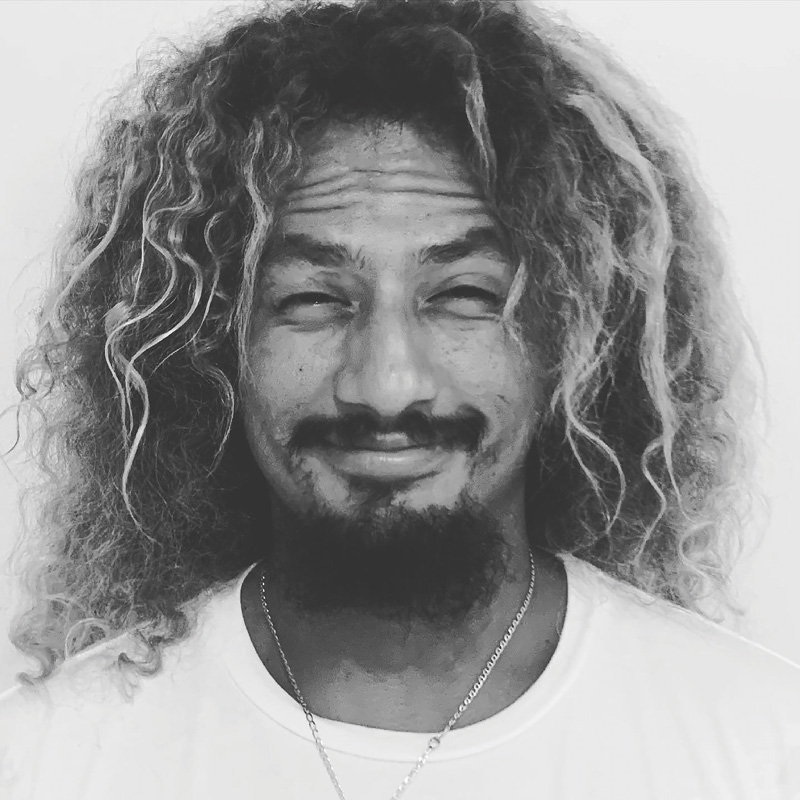
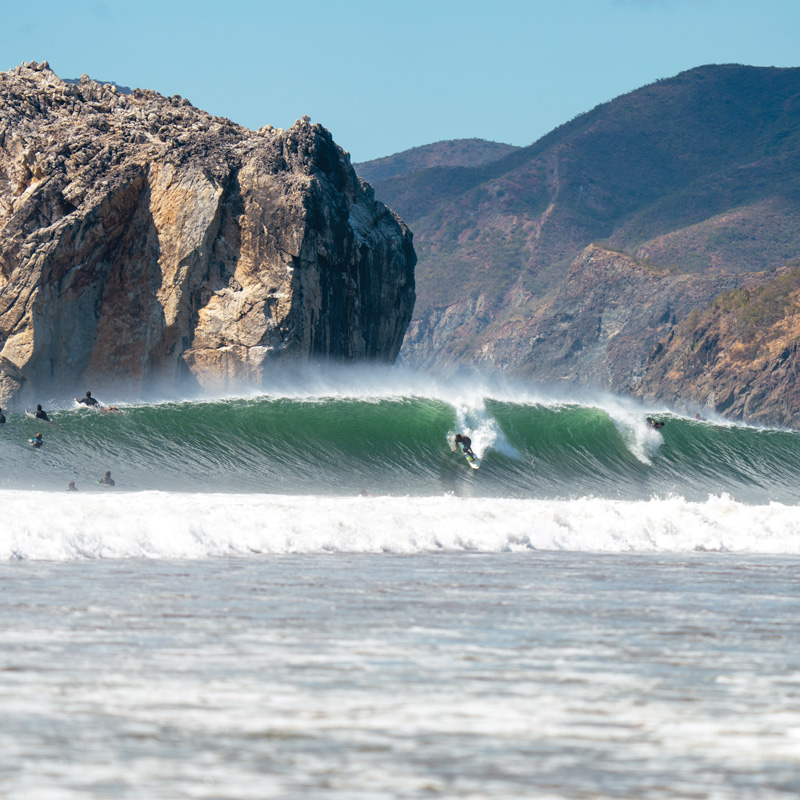
WB: Wow. Okay, now an easier one. Do you have a favorite football or soccer team in Costa Rica?
CM: I have my favorite, probably it’s Costa Rican team.
WB: Who’s your favorite player?
CM: Keylor Navas (the captain of the Costa Rican national team).
WB: Costa Rica hasn’t recorded a shark attack in over 400 years, as far as we know. Are there any other animals that people should be aware of when they’re in the lineup in Costa Rica?
CM: Oh yes, for sure. Costa Rica has many rivers, and there are a lot of places where you have saltwater and freshwater. And sometimes you can find crocs there. My recommendation is don’t surf near a river mouth.
WB: Three or four locations (restaurants, nature spots, waves, etc.) that you think everyone should visit if they have a chance in Costa Rica?
CM: If you ever come from San José to Jaco, in the middle of Jaco, there’s this place called Soda Neria, where I like to stop every time I go because the food is super good, super fresh, and the people treat you super well. And then, if you want to come to the waterfalls, I think Nauyaca Waterfalls—it looks like a temple. In San Carlos, La Fortuna, that’s a place that has the Arenal Volcano and the hot springs and that place is also beautiful.
WB: One thing you’d like your kids to be when they grow up and why?
CM: I really would like them to be intelligent about evil, that will get them close to God. If you are close to God, you have as many qualities as you need. I think if my kids have that, they will be loving, they will care about people.
WB: Who do you think is a better surfer, you or your brother?
CM: Me and my brother? I think he’s talented, but I’ve been learning so many different things though, so maybe I’m a better surfer.

